Before Supreme Court nominee Brett Kavanaugh faced multiple allegations of sexual assault, his views on abortion were seen as the biggest threat to his confirmation. Democrats and many legal analysts argued that his past rulings, writings, and statements on the subject made it clear: If Kavanaugh were to secure a seat on the nation’s highest court, he would vote to overturn Roe v. Wade, the landmark 1973 decision that made abortion legal nationwide.
Abortion was always going to be an issue in the 2018 midterms, as it is in every election. But it will be especially so if the Senate votes on Kavanaugh before November 6. If that vote fails, the right will use it to mobilize anti-abortion voters to protect the Republicans’ slim majority in the Senate, which likely would ensure that an equally conservative judge was confirmed to the Supreme Court. If the vote succeeds, the left will use Kavanaugh’s confirmation to do the opposite, encouraging pro-choice voters to elect Democrats who will fight to preserve abortion access in the face of a conservative court.
There’s been a lot of talk about 2018 being the “Year of the Woman,” because the #MeToo movement and the backlash to a misogynistic president are motivating Democratic women to vote and run for office in record numbers. But this conversation largely has neglected the fact that reproductive rights are proving to be a mobilizing force this fall, too.
“The issue is getting a fraction of the attention of President Donald Trump, health care and immigration,” Politico’s James Arkin wrote on Wednesday. “But Republican and anti-abortion groups have made it a major part of their ground game.” In the last two months, the piece notes, anti-abortion canvassers have knocked on more than 1.6 million doors in six states where Republicans believe the issue could give them a boost in toss-up Senate races. “For the first time in several midterms, the GOP is worried its base won’t turn out to vote, and abortion is a powerful motivator for the conservatives who could put Republican Senate candidates over the top in key states,” Arkin wrote.
Abortion access is also a powerful motivator for liberals, a fact pro-choice groups aren’t taking for granted. Planned Parenthood recently launched “its largest voter contact campaign for a midterm election,” USA Today reported earlier this month. That campaign includes an effort to knock on more than 3 million doors, and send information by mail to another 1.5 million voters. “When we talk to voters about what’s at risk for their health care access … they listen to us,” Deirdre Schifeling, executive director of Planned Parenthood Votes, told the paper.
The two sides are battling over more than just Kavanaugh’s confirmation and the potential overturn of Roe v. Wade. Come election day, voters will be deciding which party controls Congress, and thus what future legislation Congress might consider and pass. Party control could determine, for example, whether Congress votes to repeal the Hyde Amendment, which bans federal funding for abortions except in certain cases. It could also determine the amount of federal funding given to Planned Parenthood and other women’s health providers across the country.
Reproductive rights battles will also play out on the state level, notably in the 36 gubernatorial races. These elections are of particular importance to the anti-abortion right. “The thing pro-life people have been pushing for decades now on the federal level is just for the Supreme Court to return the issue to the states,” said Daniel Burns, a Catholic political scientist at the University of Dallas, in comments to the National Catholic Register. “It doesn’t make sense if you only care about the Supreme Court nominee and then don’t also pay attention to your state elections.”
These statewide elections should be important to the left, too, since decisions at that level often affect how easy it is to obtain a legal abortion. An increasing number of states are implementing Targeted Restrictions on Abortion Providers, otherwise known as TRAP laws, which can make it so expensive to operate a clinic that many are forced to close. This means women have to travel farther to access the procedure. Many states also have passed or considered laws banning certain types of abortions; requiring waiting periods before women are allowed to have them; or requiring permission from the man involved.
And voters in three states will be deciding on abortion issues directly come November 6. Ballot propositions in West Virginia and Alabama will ask voters whether to amend the state constitution to declare that there is no right to abortion. If Roe v. Wade is overturned—thereby returning the issue to the states, as it was before 1973—abortion immediately would become illegal in those two states. In Oregon, voters will decide whether to ban public funding from going toward abortions that are not medically necessary. But as the Trump presidency and Kavanaugh hearings have made clear, it’s that a woman’s right to control her own body will be on the ballot in every state, whether explicitly or not.

